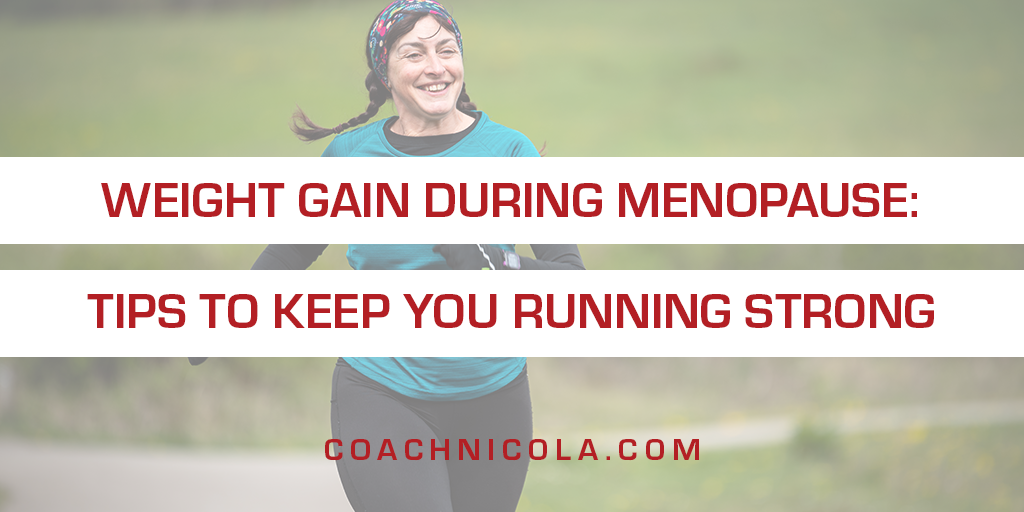
Weight Gain During Menopause: Tips to keep you running strong

Are you a runner going through menopause and experiencing changes to your body shape or are gaining weight? Even though what you are eating or how much you are running hasn’t changed.
If so, you may be wondering what you can do about it. Especially if these changes are starting to affect your running.
Here are my answers to common questions women runners have about weight gain during the peri to post menopause period.
Why am I gaining weight when I’m running and eating as much as I always have?
During menopause, even with your usual running routine, you may experience changes in your body shape and start to gain weight.
One of the key reasons for this are the changes in your hormone levels.
The decline in oestrogen can lead to an increase of fat around the belly. And the drop in progesterone can contribute to an increase of bloating and water retention.
The reduction in both oestrogen and testosterone leads to a decrease in muscle mass. This can mean more fat is stored and can lead to changes to your body shape.
And add to this the changes in metabolism as we age, which means your body burns calories less efficiently.
So, it’s a combination of hormonal changes, a decrease in muscle mass, and shifts in your metabolism that is leading to these changes.
Should I just go on a(nother) diet?
If you experience weight gain during the peri to post menopause you might immediately think the answer is to move more and eat less. Afterall, that is the messaging we’ve received throughout our lives!
But as these changes are being driven by your body’s internal processes, rather than changes to how much you are eating or running, restriction is not the answer. And it’s especially not the answer if you are a runner or are otherwise very active.
We need to start nourishing our bodies. And we can do that by making sure we are eating enough food to fuel our activities.
So, rather than thinking about what to restrict, think about what you can add.
What should I eat as a runner during menopause?
Eat more plants
Plants contain fibre which nourishes the good bacteria in our gut. This good bacteria also helps to metabolise the excess oestrogen which can contribute to weight gain around the belly and other menopause symptoms.
Choose healthy protein
Ensuring you have adequate protein (along side strength training) will help to maintain your muscle mass. Runners should aim for at least 1.2-1.6g of protein per kg of bodyweight per day. Ideally this should be spread out over the day by aiming for at least 20-25g of protein per meal.
Don’t skip carbs
We all need carbohydrates, but they are even more important if you are a runner. It’s what fuels our runs, and also feeds our brain, gives us our energy and keeps us functioning. Good carbohydrate sources are wholegrains, legumes, beans, fruit and veggies.
Fat is your friend
Menopause is not the time to go low fat! We need fat for hormone health and brain health, as well as many other functions in our body. Healthy fats should be a part of your daily food intake, and they are never something you should be afraid of eating.
But it’s important to choose healthy fats – the unsaturated fats that will also contain essential nutrients and minerals. So avocados, nuts and seeds are the things to go for.
What should I eat on days I run?
As a runner you need to fuel your training. Not eating enough can lead to LEA (low energy availability). This is when your body doesn’t have enough energy to fuel both your running and your bodily functions. This can then lead to brittle bones, increased risk for heart disease and metabolic disease. All of which are already risk factors as we move through the menopause transition.
So it’s even more important as you go through menopause to ensure you are fuelling properly for your runs, even if you are concerned about weight gain.
If you are used to going on fasted runs first thing in the morning, try eating something before a run instead. A small snack with carbohydrate and protein like a banana with peanut butter or a high protein yoghurt and fruit will be easy to digest and give you the energy boost you need for your running.
When you do a long run or hard sprint session, make sure you eat something within 30 minutes that contains both carbs and protein. This will help your muscles to build and repair, rather than break down.
This can be as a snack or you can time your harder sessions with your meals – so run before lunch and then eat your lunch.
Making positive changes
It may seem counter intuitive to look at what and when you are eating, rather than how much you are eating, if you are concerned about weight gain during menopause.
But these positive changes to the way you eat, along with other lifestyle changes, can help you not just during the peri to post menopause but for your long term health as well.
And as a runner going through the menopause, these changes will help to keep you enjoying the running you love both now and in the future.
And if you are a runner going through menopause who wants guidance, support and training advice, do get in touch. I have group programmes and bespoke personal coaching packages that can help you to reach your goals.

Leave a Comment
(0 Comments)